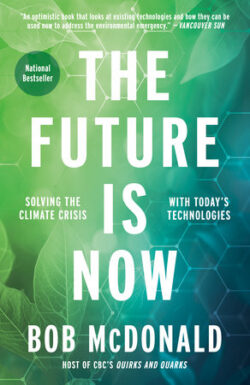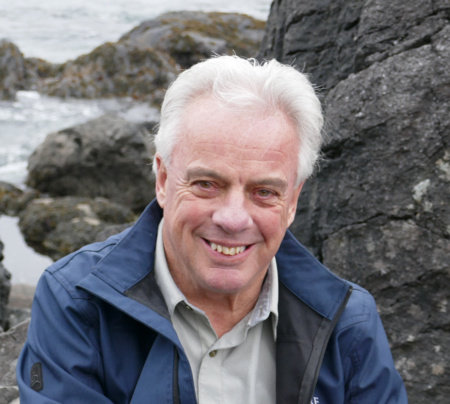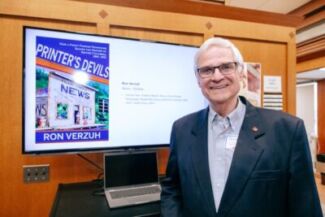Fighting global warming
The Future is Now: Solving the Climate Crisis with Today’s Technologies
by Bob McDonald
Toronto: Penguin Canada, 2022
$23 / 9780735241961
Reviewed by Ron Verzuh
*

In spite of U.S. presidential candidate Donald Trump’s claim that climate change is a “hoax,” most of us know otherwise. MAGA hat wearers excepted, we know we need to lower the Earth’s temperature by slowing the carbon emissions that lead to global warming. In his new book, CBC Quirks and Quarks science show host Bob McDonald provides some optimistic solutions.
McDonald has spent a lifetime helping us understand what scientists often can’t explain in plain language. We’ve come to trust him to offer clear explanations for earth’s calamities and explore for us the infinite possibilities that lie ahead. In The Future is Now, he applies his friendly wit and wisdom to the most significant scientific problem ever: how to undo the climate change mess using existing technologies.
At first, I questioned the notion that we could rely on technology to solve the problems caused by technology. It seemed a slippery slope. But McDonald explores ways that using current technology could lead us out of the impending darkness.
Is McDonald arguing that technology will solve the problem? Not really. What he is saying is that along with all the renewable energy resources that exist, technology could enhance their effectiveness. He’s not suggesting machines can replace solar, wind, tidal, and other forms of green energy. What he is suggesting is that combined with those forms of energy generation, new and existing technologies can help ensure that safe, clean energy is sustainable well into the future.
Make no mistake. “There is no magic bullet,” McDonald warns, “no single clean alternative that can be slotted in to replace fossil fuels.” He cites nuclear energy as a possibility but one fraught with “a unique set of issues, technical, social and political.” So renewables won’t save the Earth by themselves, but science and technology are working on ways to do so as a team effort. The good news is that the technology “already exists. It just needs to be employed on a larger scale.”
McDonald says “Pitting tree huggers against oil magnates is not productive.” Better to combine forces to solve the problem. Take solar energy. As with much of the book, McDonald relies on history to prove his points. For example, he describes solar energy using an experiment by Roman mathematician Archimedes, who in the third century BCE tapped the Sun’s energy to fight the Carthaginians.
It didn’t work effectively, but it points us to modern uses of the Sun’s power. “Some regions are finding clever ways to build large-scale solar farms closer to cities without taking up more land. They build them over water.” In a recent trip to Germany, I saw vast solar and wind farms dotting the highway between Berlin and Hamburg. Clearly that country has invested in technology to produce green power.
McDonald applies the same theory of renewables plus current energy-producing methods to biofuels like ethanol, wind, tidal, hydrogen, geothermal, and even small nuclear plants. Combined with cleaner ways to extract oil, gas and other fossil fuels is the book’s challenge to the rest of us. “Every form of energy conversion comes with costs and consequences,” he explains, as he proceeds to tell us how all these energy sources need to be developed with the economy (jobs, affordability) and safety always in mind.

With wind power, for example, he cites statistics that show coal’s carbon footprint is 90 times greater. Get ready for more scientific facts like that one as we work through the other future energy sources. While the book tries to keep the solutions simple, that’s not always easy when you’re dealing with complex scientific terms and concepts. But McDonald uses plenty of anecdotes and household examples to help us.
In the case of hydrogen, “a clean alternative to fossil fuels,” the book turns to history with a reminder of the Hindenburg, the hydrogen-fueled airship that exploded in 1937. “Despite its scary reputation, hydrogen is a remarkably clean fuel,” McDonald explains. It is safer than gasoline or diesel and “incredibly safe.”
With all the other renewable energy sources, the book explains the pros and cons. With hydrogen, storage and distribution are blocking its progress. Technology will eventually solve such problems so we can take advantage of this and other renewables on our way to a carbon-free future. Ever the optimist, McDonald assures us that it will come.
He’s even optimistic about the technical innovations that have failed. Flying cars, space-based sunshades, underwater balloons, and kite flying are all developments that aren’t quite ready to deploy in the fight for a safe planet.
In his wrap-up chapter, McDonald calls for cleaner versions of renewables that “actually make money.” He recalls watching The Jetsons on TV as a kid and marveling at all the inventions. Today many of them exist or are possible in “a new industrial revolution.” But here’s the final hurdle.
“The solutions are there,” McDonald advises. But “action on climate change requires the same global effort as fighting a pandemic.” We can ignore it for a while, he adds. We can apply short-term fixes, “or you can get to the source of the problem and fix it for good.” The Future is Now points us in that direction with facts on innovations that can help guide us. Denying that the problem exists or calling it a hoax can only move us deeper into the kind of climate-change destruction we are already witnessing.
*

Ron Verzuh is a writer and historian. [Editor’s note: Ron has recently reviewed books by Rosemary Cornell, Adrienne Drobnies, and Tim Bray [eds.], Derek Hayes, George Galt, David Lester and Marcus Rediker with Paul Buhle, David Spaner, and Ken McGoogan for The British Columbia Review.]
*
The British Columbia Review
Interim Editors, 2023-26: Trevor Marc Hughes (non-fiction), Brett Josef Grubisic (fiction)
Publisher: Richard Mackie
Formerly The Ormsby Review, The British Columbia Review is an on-line book review and journal service for BC writers and readers. The Advisory Board now consists of Jean Barman, Wade Davis, Robin Fisher, Barry Gough, Hugh Johnston, Kathy Mezei, Patricia Roy, and Graeme Wynn. Provincial Government Patron (since September 2018): Creative BC. Honorary Patron: Yosef Wosk. Scholarly Patron: SFU Graduate Liberal Studies. The British Columbia Review was founded in 2016 by Richard Mackie and Alan Twigg.
“Only connect.” – E.M. Forster
4 comments on “Fighting global warming”
Please take note: most ‘deniers’ don’t deny so much as they question. To refuse to engage the questions will likely do more to ‘lead us into climate change destruction.’ To insist you have the answers while denegrating questioners is the most unscientific stance of all. For that reason, the arrogance of climate alarmists may well pose the greatest dangers to the environment. What say ye?